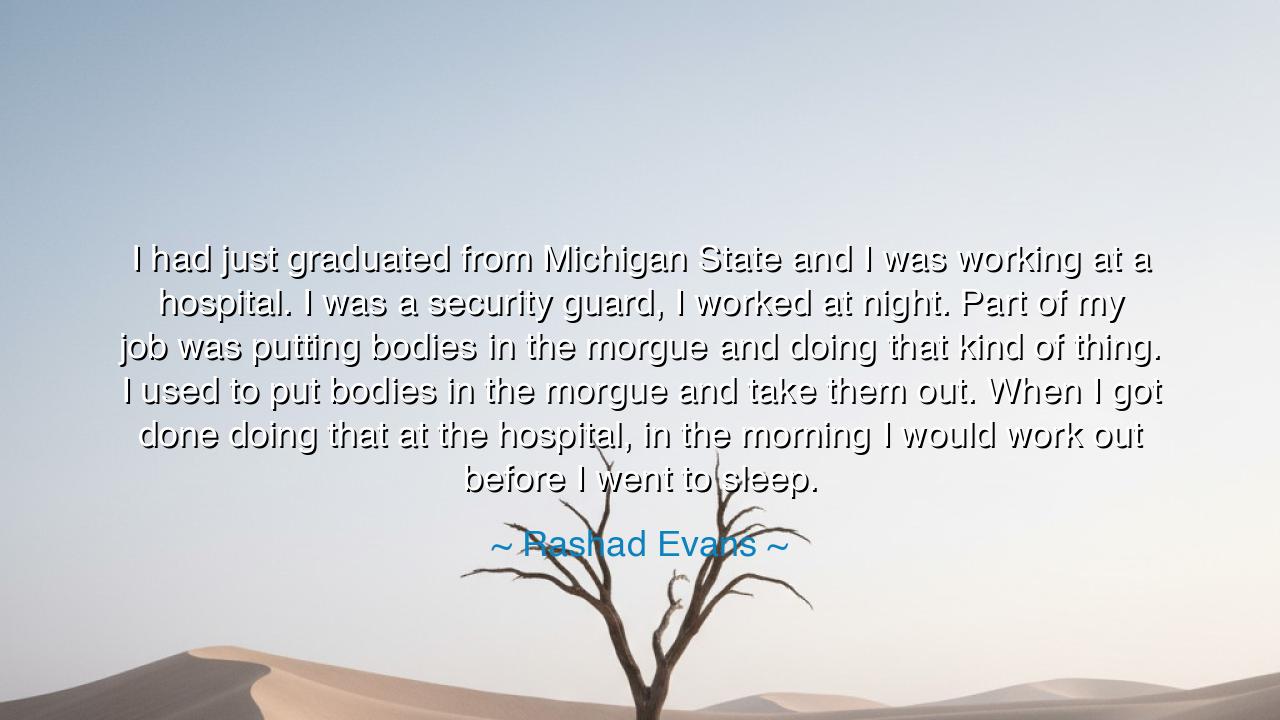
I had just graduated from Michigan State and I was working at a
I had just graduated from Michigan State and I was working at a hospital. I was a security guard, I worked at night. Part of my job was putting bodies in the morgue and doing that kind of thing. I used to put bodies in the morgue and take them out. When I got done doing that at the hospital, in the morning I would work out before I went to sleep.






"I had just graduated from Michigan State and I was working at a hospital. I was a security guard, I worked at night. Part of my job was putting bodies in the morgue and doing that kind of thing. I used to put bodies in the morgue and take them out. When I got done doing that at the hospital, in the morning I would work out before I went to sleep." — Rashad Evans. These words by Rashad Evans speak to the profound resilience and discipline required to face life's challenges, especially when those challenges seem heavy, overwhelming, or even macabre. The image of placing and removing bodies from a morgue is one that evokes a sense of the transience of life, the finality of death, and the mental toughness needed to carry on in such an environment. Yet, what Evans reveals is not just the grim nature of his work, but the strength of his spirit to rise above it. After confronting the darkness of death, he chooses to embrace the light of physical fitness, a practice that shapes both his body and mind.
In the ancient world, warriors and philosophers alike understood the power of discipline, especially in the face of hardship. Spartan warriors were renowned for their endurance, resilience, and unwavering commitment to their physical and mental conditioning. From a young age, these warriors were taught to embrace the harshest of circumstances, whether it was through their grueling training or the difficult realities of battle. The ancient Greeks believed that true strength came not from avoiding challenges, but from confronting them head-on, learning to transform hardship into growth. Evans's story mirrors this ancient truth. He could have been consumed by the grim nature of his job, but instead, he chose to channel his energy into self-care and strength, using his physical training as a way to transcend the hardships he faced.
This resilience is also reflected in the life of Alexander the Great, whose journey was filled with battles, loss, and near constant hardship. But despite the challenges, he understood that the true battle was within: his ability to persevere, his capacity to maintain his focus, and his strength to lead his men. His days were filled with the harsh realities of war and conquest, yet his ability to stay grounded and disciplined allowed him to shape the world in ways that others could not. Evans, in his humble yet powerful way, embodies the same spirit. The act of working in such a difficult environment and then choosing to work out—to build strength—is a statement of inner power. Alexander taught us that strength is not just a physical trait, but a mental one that emerges through discipline and purpose.
The Stoic philosophers of Rome, such as Seneca and Epictetus, also believed in the importance of enduring hardship with grace and using adversity as a path to personal growth. Epictetus taught that the mind is like a muscle, and that only by pushing through difficult situations could one grow stronger, not just physically, but spiritually. Evans, by choosing to work out after his intense and demanding shift, follows the Stoic principle of transforming the body into a tool of resilience, of using physical discipline to bolster the spirit. Just as the Stoics believed that adversity was not to be feared but embraced, so too does Evans show us that the grind of life, even in its darkest forms, can become a forge for strength and character.
This concept of self-discipline as a way to overcome adversity is not limited to the ancients alone. Think of the modern-day athletes who face extreme physical and mental challenges in their training and competition. Consider Michael Jordan, whose competitive drive and relentless training regimen were legendary. After experiencing loss and failure, Jordan would rise again, always pushing himself harder. His story, much like Evans’, teaches us that it is not the external challenges that define us, but how we choose to respond to them. Evans's decision to work out after performing a job so grueling and psychologically taxing is a powerful reminder that strength is not just about the body, but about the mind and will to overcome.
The lesson here is clear: resilience is not simply a response to difficult circumstances; it is a choice we make each day. Whether facing physical labor, emotional turmoil, or the grief of loss, we must choose to rise, to persevere, and to transform our difficulties into opportunities for growth. Evans demonstrates that it is through discipline, through creating rituals of strength, that we begin to transcend the hardships of life. We may not control the world around us, but we control how we respond to it—and it is through this response that we craft our destiny.
So, when faced with life’s challenges, remember Rashad Evans’ story. When the world seems dark, when the burdens feel heavy, it is in those moments that our discipline will define us. Whether it is physical training, mental focus, or simply the will to keep going, we must choose to rise, to fight, and to transform our adversities into opportunities for growth. Just as the ancients knew, strength does not come from avoiding difficulty, but from embracing it with resolve, and purpose. May we find the courage to face the grind, and like Evans, turn our struggles into the very source of our power.






AAdministratorAdministrator
Welcome, honored guests. Please leave a comment, we will respond soon